As with all schools in England we use Synthetic Phonics as our main vehicle for learning to decode, read and spell words.
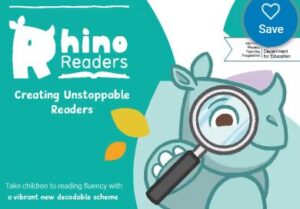 We use the DfE accredited Rhino Readers scheme as the scheme and progression for our teaching and our home reading books match the phonics skills taught in daily lessons. Our consistently high phonics screening scores at Year 1 validate our teaching and progression.
We use the DfE accredited Rhino Readers scheme as the scheme and progression for our teaching and our home reading books match the phonics skills taught in daily lessons. Our consistently high phonics screening scores at Year 1 validate our teaching and progression.
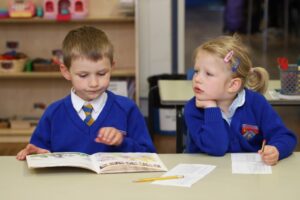 We aim to build children’s speaking and listening skills in their own right as well as to prepare children for learning to read by developing their phonic knowledge and skills. Our teaching is a systematic programme for teaching phonic skills for children starting by the age of five, with the aim of them becoming fluent readers by age seven.
We aim to build children’s speaking and listening skills in their own right as well as to prepare children for learning to read by developing their phonic knowledge and skills. Our teaching is a systematic programme for teaching phonic skills for children starting by the age of five, with the aim of them becoming fluent readers by age seven.
It is important to remember that letters have Names and they make Sounds. Phonics uses letter sounds to make sense of words. This may take some getting used to!
Please see Class teachers if you have any questions.
Assessment
Children are assessed as par of ongoing teaching in every lesson. Those identified as needing additional support are targeted prior to the next phonics lesson to ensure that they can keep up with the pace of the class. Children will be formally assessed termly to establish their progress and to target additional support where it is needed.
At the end of Year 1 children will sit the National Assessment in Phonics, this is a pass or fail exam and the pass mark is set annually. Children are expected to pass. Those who do not will take the test again at the end of Year 2.
Testing is done discreetly and children often really enjoy the Phonics ‘Quiz’. These results will be reported to you in the end of year report.
Phonics assessment is a positive process, all children will be given support where needed and no matter the result will be praised for the progress they have made from their own personal starting points.
Documents to support phonics
Physical reading books are sent home with children but families can also engage with reading using eBook collections and the Rhino Readers app. For more information on these please see your class teacher.
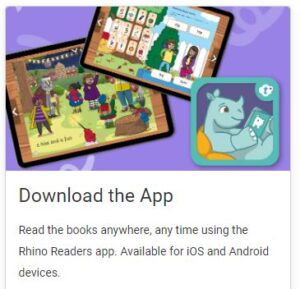
At Harewood our children enjoy reading and this shows itself in how the children talk about their reading and in their assessment outcomes. This does not happen by chance. At Harewood we put a lot of effort into making reading enjoyable and ensuring that our children have the skills they require to access books.
We have a Reading Skills Progression document which shows the skills expected at each stage of a child’s time at Harewood. This can be downloaded from the link below.
Harewood Reading progression document
We supplement our own books with borrowed books form the Leeds Library Service. These include fictions and non-fiction texts linked to our topics. This ensures a good range of new, relevant books are always available. We have themed books days including celebrating World Books Day and we have regular author visits to inspire our children.
At Harewood we have spent a lot of time carefully choosing the diet of books that the children read as they progress through school. These books include picture books, classic novels, modern texts and non-fiction. Often the texts relate to topics or are linked to the writing genres being studied. In some cases they are chosen just for reading pleasure as we know the children really enjoy them. Our list of core texts can be downloaded from the link below.
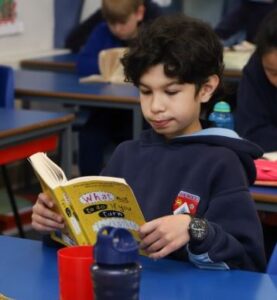 Our core reading scheme is based around books from Oxford University Press with the early phases being matched to phonic teaching to ensure that the children can fully decode their books. Later through school the children move onto banded ‘real’ books.
Our core reading scheme is based around books from Oxford University Press with the early phases being matched to phonic teaching to ensure that the children can fully decode their books. Later through school the children move onto banded ‘real’ books.
Reading is more than simply decoding words. Making sense of what you read right from the first word is critical. You can be of huge support in developing your child’s comprehension skills. Try some of the questions below at story time to get your child into the habit of think more widely about the story they are hearing.
In Key Stage 2 reading is taught through carefully planned whole class reading sessions, small group reading and individual reading where required. Our children reading sessions and reading as a gateway to other learning and as a skill for life.
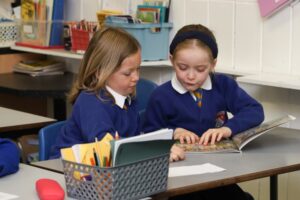 When attempting ‘comprehension’ practice at home, we would advise starting with some of the questions above. Follow on by rereading the page or section. Then get the child to check any words they do not recognise and discuss what they mean. Ask questions and get them to ask you questions about the page/text to make sense of what is happening in the piece. Then in the shortest words possible summarise the critical pints of the story (ensure they do not add extraneous information). Finally make a prediction for what will happen next. Not at the end of the story but directly after this page or passage.
When attempting ‘comprehension’ practice at home, we would advise starting with some of the questions above. Follow on by rereading the page or section. Then get the child to check any words they do not recognise and discuss what they mean. Ask questions and get them to ask you questions about the page/text to make sense of what is happening in the piece. Then in the shortest words possible summarise the critical pints of the story (ensure they do not add extraneous information). Finally make a prediction for what will happen next. Not at the end of the story but directly after this page or passage.
This is a brilliant way of interrogating the story and you will often find yourself amazed by the interesting ideas children share during these sessions.
This process moves us away from the ‘harder books, longer words’ in traditional reading teaching and encourages children to really think about and enjoy reading. We have found it to be an excellent way to ensure that our children become natural and fluent readers. If you need any support on this please do not hesitate to discuss it with your child’s class teacher.
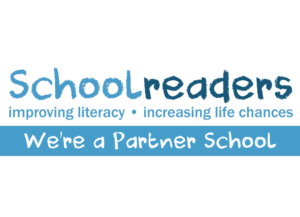 We are a Schoolreaders partner school
We are a Schoolreaders partner school Schoolreaders recruits, places and supports volunteers in local primary schools to give children one-to-one reading support on a weekly basis, boosting their literacy skills, confidence, and reading fluency. We are proud to be a partner school, able to provide our pupils with this valuable extra reading time each week!
Find out more at Schoolreaders.org
In school, we really appreciate all the time families out in with their children reading at home both with their school reading books and with other texts. Any time you can give your child really helps. The ideal would be to spend 10-15minutes reading with your child everyday but this should be at least 3 times per week. As well as reading the books, re-reading them to develop fluency and confidence and discussing the story are really beneficial.
To help families with home reading we have put together an information booklet for parents. This guide will probably be full of things you already know but will also contains hints and tips for making home reading both enjoyable and effective. Please also look out for our reading bookmarks with a number of useful questions to use when discussing the books.
If you have any questions or require information about how to help with reading, please contact your class teacher who will be happy to help.
Below are websites/resources you may find useful when supporting your child in learning at home: